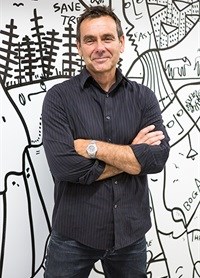






When Granger arrived at Y&R Advertising in 2008, his mandate was to build a collaborative creative culture across the more than 90 international Y&R offices. Here’s how he’s doing so, while also being well-recognised for his personal creativity and leading Y&R in its success as one of the most awarded global networks at Cannes with a ranking as third agency network of the year and scooping up 99 Lions across 19 categories, including a Grand Prix in media for Team Red Istanbul.
Granger does so by attracting some of the industry’s best creative talent and infusing the network with his passion for creating innovative and effective work.
The son of a Spanish ballerina and Portuguese businessman who was raised in Johannesburg, Granger has a global mindset, having lived in London, New York, Panama and Minorca.
Here, he shares how his love of local culture has been a deep influence on his creative thinking, his personal success story and how the Y&R network keeps its creative fires stoked…
 Share the nutshell version of your personal career highlights.
Share the nutshell version of your personal career highlights.I started off as a musician. Recorded, produced, played the clubs. But I kept having recurring nightmares that I was playing in the corner of a restaurant with the sounds of knives and forks clanging on plates and other people’s conversations, and they always made me break in a cold sweat. So I thought… hey, advertising looks like a cool thing. And it’s been 35 years now.
I started at Grey and then some small boutique-y agencies, but then moved to Hunt Lascaris. John Hunt was my mentor and I stayed there a very long time and learned a tremendous amount from him. Among the many things he instilled in me was the importance of dreaming big. His vision was for Hunt Lascaris to be the first South African agency to have creative credibility, not just beyond Africa, but around the world. He was very focused. We attracted the best people and clients and it was the 1990s, so we had an enormous amount of fun there.
I’d always had an eye on New York. The right moment arrived, and I left to go to Bozell, which was billing a billion dollars back then. Absolutely giant clients there—and I was determined that we could do great work for these massive accounts. The agency quickly became one of the most awarded. After my tenure at Bozell, I went to Saatchi in London and then to Saatchi NY and in three years, they became the most awarded agency on the planet, firing on all cylinders.
Nine years ago, I came to Y&R. And here I am…
 Explain the importance of having built a collaborative culture across the then 189 international Y&R offices.
Explain the importance of having built a collaborative culture across the then 189 international Y&R offices.
In order to understand Y&R, you should know that it was the very first agency to be founded by a creative, Raymond Rubicam. He had a simple principle that he felt applied to everyone at the agency, no matter what their job was: 'resist the usual'. By which he meant: don’t just jump in and do what is automatic and expected. Stop, look, observe, think about the challenge. Approach things creatively.
This has really played out across the agency. So, for example, we are organised as a global boutique. We want all of our offices to have deep roots in their market, to have the cultural, creative currency that is relevant to local consumers. Because people buy locally, of course. But at the same time, we are global—so we are organised to collaborate and share talent and resources and tools.
I’ve now turned that into a way of working creatively. We’ve worked very actively to create a global community. We have a platform that allows us to share work and interact in real time. And we do face-to-face meetings during the year, which creates the friendships, the recognition that we are connected to other agencies that have the same vision and values. And over time, this has created an atmosphere—and really a process—in which people from different offices can work on a single assignment because we know who is great at something in particular and who has expertise in doing something else. It is collegial and collaborative with just the right amount of competitiveness that makes people always want to be on their game. I’m very proud of how we collaborate creatively—I don’t think it’s common in our business. So, yes, resist the usual again.
 How does SA advertising differ to that of the rest of the continent and, indeed, the globe?
How does SA advertising differ to that of the rest of the continent and, indeed, the globe?
I grew up in the apartheid era in South Africa and, in those times, culture was very fragmented and segregated. It was not possible to really dig into local culture, so we looked to the UK and the US for identity. But I remember when it began to shift. We worked with the ANC, were really privileged to work on their campaign and for the new constitution, and you could feel South Africa opening up.
.@adforum's Weekly Top 5 - Congrats Y&R Cape Town! https://t.co/hziA4O9meS pic.twitter.com/4ZcCmXQ5pp
— Young & Rubicam (@YoungRubicam) December 12, 2016
 Any predictions about the future of African creativity based on your most recent visit?
Any predictions about the future of African creativity based on your most recent visit?
When it comes to media, Africa has followed a very different trajectory from much of the world. While much of the world went from desktop to laptop to mobile to smartphone, Africa went straight to mobile. I remember reading a year ago that smartphone use had doubled in just two years in Africa. When you look at projects, like the one Google is close to rolling out—balloons that can be put in rural areas that will create instant connectivity without having to make major investments in infrastructure—the catch-up time will keep accelerating.
So there will be more and more mobile, and more and more content. The generation coming of age is really a maker generation – they make stuff that used to be only the domain of highly trained professionals. So I see a content explosion as the kids make music, films and images on smartphones. Film will only gain even more importance in this environment, because that’s what people share. Over 400 million Snaps are shared on Snapchat every day and almost 9,000 photos are shared every second. Every day people watch hundreds of millions of hours on YouTube and generate billions of views. More than half of the views come from mobile phones.
So, imagine how quickly it will all ramp up. I always think that times of great change and learning are always particularly creatively fertile. It will be particularly interesting to watch in Africa, because I think people will use mobile to connect the physical and virtual worlds because I think there’s an instinctive understanding here that while digital is everything, not everything is digital. It will be exciting to watch and participate.
We’ll definitely be watching! Visit WhyWeAre.co.za for more, click here to find out what 'resist the usual' means to the Y&R SA team, and be sure to follow Granger and Y&R SA on Twitter for their latest updates.
